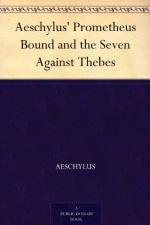
|
| Name: _________________________ | Period: ___________________ |
This test consists of 15 multiple choice questions and 5 short answer questions.
Multiple Choice Questions
1. What is the name of the fire-breathing monster on the 4th general's shield?
(a) Typhon.
(b) Ox.
(c) Spinx.
(d) Dragon.
2. Scout describes all of the following, in the beginning of part 3, to Eteocles except:
(a) Which gate each enemy general is set to attack.
(b) Each of the enemy generals.
(c) The emblem on the enemy general's shield.
(d) The type of horses the armies are riding on.
3. What does Eteocles accuse the Chorus of being?
(a) Brave.
(b) Disloyal.
(c) Liars.
(d) Cowards.
4. Who does Eteocles promise to put in prison if they do not obey him and bravely face the danger of war?
(a) Men.
(b) Children.
(c) Women.
(d) Any citizen.
5. Who is the second general Eteocles sends out?
(a) Hippomedon.
(b) Lasthenes.
(c) Megareus.
(d) Polyphontes.
6. "White haired" women, "housewives," and young virgins are all described to be ___________.
(a) Equal beings.
(b) Equal victims.
(c) Equal criminals.
(d) Equal culprits.
7. Who represents Eteocles' stubbornness while his shield represents Eteocles' passions?
(a) Kapaneus.
(b) Parthenopaios.
(c) Eteoklos.
(d) Tydeus.
8. Who represents the way that Eteocles has followed his own will which he honors more than he honors the will of the gods?
(a) Polyneices.
(b) Kapaneus.
(c) Parthenopaios.
(d) Amphiaraos.
9. What literary form does the Chorus use to describe the destruction and violation of the city's moral?
(a) Farce.
(b) Burlesque.
(c) Imagery.
(d) Prose.
10. Eteocles instructs the Chorus to pray for ________ instead of safety?
(a) Strength.
(b) Peace.
(c) Suffrage.
(d) Reconciliation.
11. Men see the act of combat as _________.
(a) Glorious.
(b) Gruesome.
(c) Horrifying.
(d) Duty.
12. Who promises to "bring this man [Polyneices] to his harbor, and he shall enjoy his father's city?"
(a) Antigone.
(b) Aktor.
(c) Ismene.
(d) Dike.
13. Eteocles' story and actions echo the story and actions of which other story?
(a) Oedipus.
(b) King of Argos.
(c) Laius.
(d) Polyneices.
14. Who vows to either kill Eteocles or drive him into exile?
(a) Parthenopaios.
(b) Polyneices.
(c) Kapaneus.
(d) Tydeus.
15. Traditionally, males are more concerned with _______.
(a) Women.
(b) Their children.
(c) Battle itself.
(d) Their social standing.
Short Answer Questions
1. The theme of the play is based on what two stories?
2. What does the Chorus do when they hear the sounds of attack from outside the walls?
3. The principle contrast in Part 2 represents traditional male and female differences in the thought about __________.
4. Who does Eteocle appoint as the last and head general?
5. Eteocles' refusal to respect his agreement with Polyneices indicates his desire to ___________.
|
This section contains 399 words (approx. 2 pages at 300 words per page) |

|




